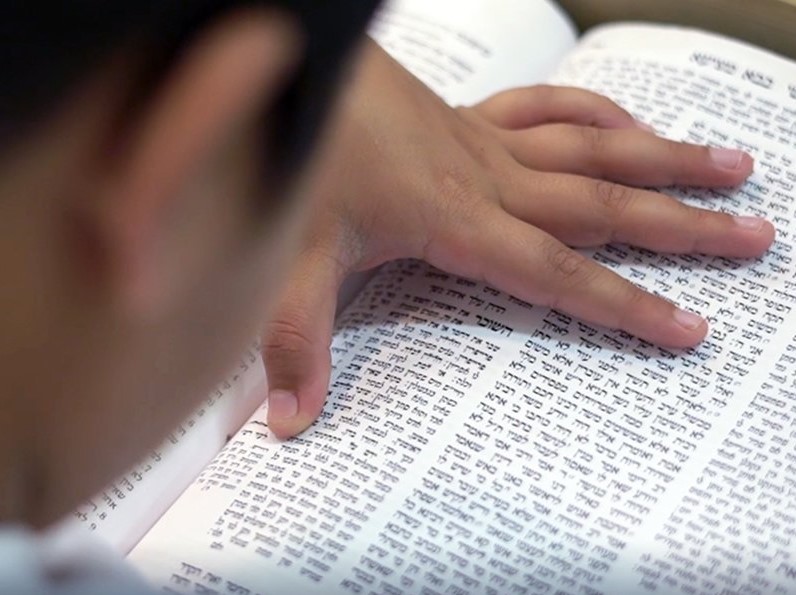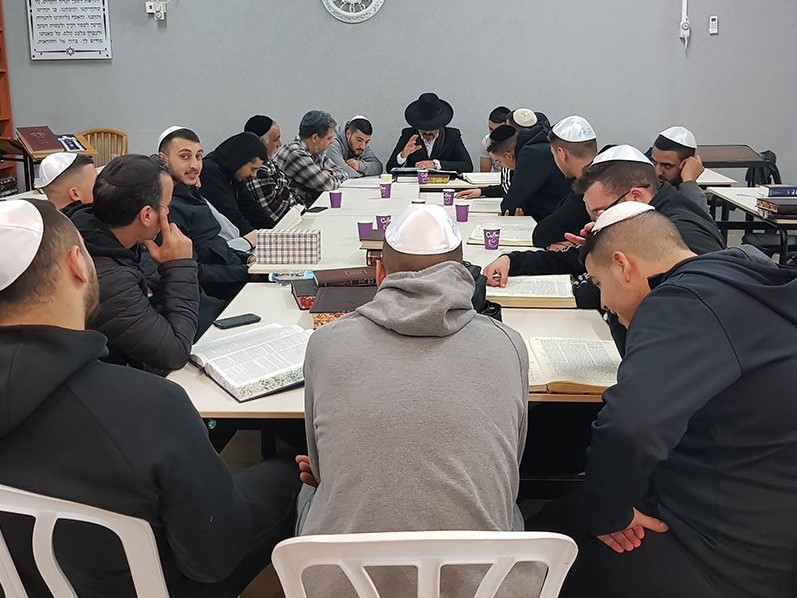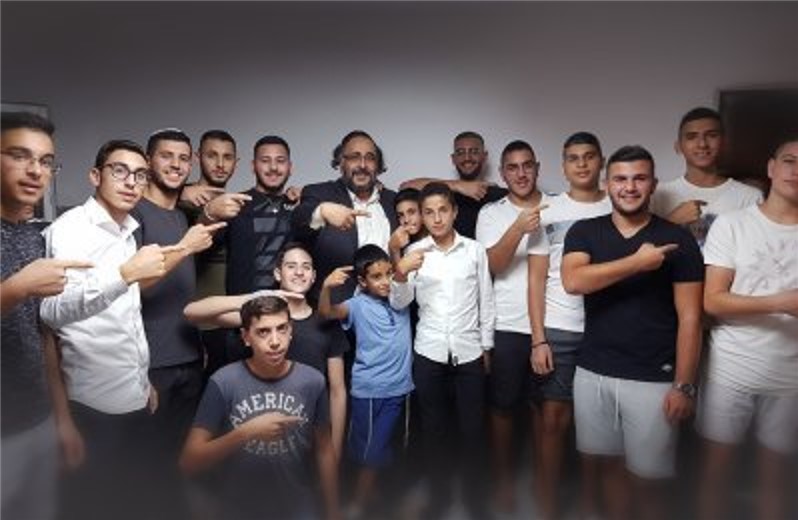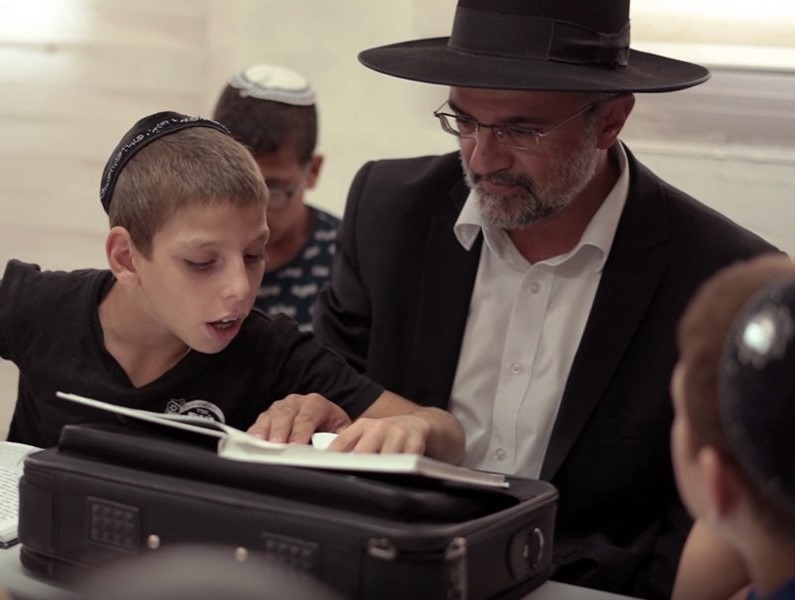"We Thought He'd Become a Yeshiva Student, But He Spiraled to the Lowest Depths"
The boy who confused prayers and eventually became a young rabbi, the teenager who flew to Canada and continued studying in a yeshiva, and the young men who come every Shabbat night for a six-hour class. Rabbi Pinchas Badush, head of the 'Chanoch LaNa'ar' movement in Beit She'an, shares about 22 years of touching and inspiring activities.
 (Photo credit: shutterstock)
(Photo credit: shutterstock)"Do you see this boy?" Rabbi Badush shows me pictures from his extensive outreach work in Beit She'an, stopping at a young boy, almost a child, with a large quiff, a swinging earring, and a curious look. "If you notice, this is a relatively old photo – about ten years ago. This sweet child came to our activity, and that very evening one of the great rabbis was our guest, and he sat beside him. We prayed Ma'ariv, and afterwards, the rabbi was about to give a class. I asked him what he would talk about, and he answered that he intended to speak at the most basic level, since it seemed to him that this is the stage our students were at. I asked why he thought so, and he said he heard the child next to him praying the Amidah, and when he reached the 'Modim' prayer, he said both the 'Modim d'Rabbanan' and the regular 'Modim', which shows that even the rules of the Amidah are not fully known, so it makes sense to speak at the basic level.
"About ten years have passed since, and recently the same rabbi came again to give us a class, this time in front of yeshiva students and kollel scholars. He spoke on a very complex topic and mentioned a certain book that was completely unknown, and then someone pointed it out and quoted it by heart. The rabbi was stunned, and he said to me afterwards: 'I give classes in kollels across the country, and no one knows this book.' I couldn't help but smile in response, and I reminded him of the previous visit, ten years ago. 'This rare scholar,' I said to him, 'is the child of Modim d'Rabbanan.'

Children of Outreach
Rabbi Badush continues to show the pictures, and it's hard not to notice his immense love for the children, young men, and scholars who appear in them. All are residents of Beit She'an, all are brought closer to Judaism through the 'Chanoch LaNa'ar' movement which he leads.
"It all started with a small class," he explains, excitedly noticeable. "A small, minor class I gave to a group of young men. This was about twenty-two years ago, at a time when there were almost no signs of Judaism in Beit She'an. I lived in the city and felt my mission was to establish a small class, so that boys who nevertheless wanted to taste Judaism would have somewhere to go.
"I started the class with a small group of young men, all from non-observant families, and they felt this was an opportunity for them to be in a framework where they could connect, ask questions, and get answers. Only later did I realize something else – they weren't just looking for Judaism, they also longed for warmth and attention – things that were so lacking in their educational frameworks and are often still missing today.
"When I saw the class grow and more and more boys joining, I decided to expand the activity and set up a small place that became a home for youths. I called it 'Chanoch LaNa'ar'. It's not just a name, but for me, it's the essence – 'Train the child according to his way', meaning – not according to our comfort zones, but to seek the real problems and treat them, while bringing young people to Judaism according to their way and what interests them.

Can you give examples to understand what you mean by that?
"Certainly. From the very first moment I realized that for young men to keep coming to us, they need not only spirituality but also materiality. Therefore, every evening we provide them with a hot and good meal, we have a rich play area, and we go on many trips and activities.
"Beyond the enjoyment, it is also important for us to convey the message that there is no contradiction between being observant of Torah and mitzvot to the maximum and combining these with experiences and fun.
"Today we are already dealing with the second generation of graduates we started with twenty-two years ago," he reveals, "Our activity is very broad and includes institutions throughout the city, a Talmud Torah for boys and a school for girls, and even a small yeshiva. As I mentioned, many students are the second generation of baalei teshuva. We still remember their parents, who started coming to us at the beginning of their return journey."
A Change of Path
The more you talk with Rabbi Badush and hear the special affection and warmth woven into his words, the more you can understand the young men who come to the place. There seems to be something attractive in the warmth and atmosphere spread there. Something magical.
Yet, these are young boys. Wouldn't they prefer to go to a soccer game, for instance, or any other outing?
"That's true, maybe soccer interests them more, and usually when they come the first time they don’t think they’ll keep coming regularly," explains the rabbi, "They peek in out of curiosity, and after that, it’s our job to make them want to come again and again. Nowadays, I don't work alone; I have a big team of dozens of young rabbis from all over the city who do the work, and when a new boy comes to us, he can almost see how all the staff are so happy with his arrival, and that gives him a great feeling. It's genuine joy that you won't find in school or club. Apparently, it's also interesting here; therefore, the boys keep coming."

And what about the parents? Isn't there any opposition from them?
"Usually, in the initial stages, the boys don't yet change outwardly, so it doesn't bother the parents. They even enjoy that their children have a framework during the evening hours. The problem and the parents' reaction arise when external changes start, which actually stresses them out."
And what do you really do in such situations?
"From the first moment, we educate the children with the phrase: 'You change the environment, don't wait for it to change you.' Our aspiration is to influence the environment positively, to show outwardly the beauty of Judaism and the new things we recognize. It's such an important message for the boys because sometimes some connect with us so much, but when they go back out into the street, they start to get confused.
"I also keep close contact with the parents and constantly explain to them that their son doesn't come to us because he's against them; he simply chooses a different path. It's not that he chose an easier lifestyle, but quite the opposite – he demands more of himself than he did before and they need to appreciate him for his choice. At the same time, I also tell them about our trips and outings so they understand we’re not putting the kids in a closed ghetto, but really allowing them to enjoy everything. Of course, there are parents who take time to assimilate these things, especially if the children continue to the yeshiva world and change dress and lifestyle. But I can testify firsthand that eventually, everyone is happy and very encouraged and proud of it. There were even cases where there were challenges with the parents, and later suddenly there was a withdrawal when the child stopped coming to us. The parents contacted us and asked what happened, they felt regret about the child’s withdrawal, which means they did, in the end, connect to it. It just stressed them out at first."
It can be assumed that it’s also not easy for the children with the change...
"Of course, it's not easy. The moment they decide to take on Judaism as a way of life, the challenges accompany them all the time. They can't go to the sea with the parents on Shabbat, they give up trips to hotels or flights abroad when they know Shabbat observance or kosher could be at risk, and there are more challenges in other areas as well. These are sacrifices at every step, but we try to show them that our personal life sacrifices are minor compared to the great reward we receive in return – it's the tremendous spiritual experience and the vast knowledge of the Torah. It takes time to understand that, but it’s exciting every time to see the young people connect to Judaism and come regularly."
Never Give Up
You said your activities take place every evening. What do you actually do there?
"We divide the children into groups – we have the 'beginners' who come for just an hour a day, and during that hour they study Gemara and a little bit about the parasha, and then enter the play area and enjoy a hot and tasty dinner. Meanwhile, they also learn about washing hands, blessings, and the like. All pleasantly, of course, we don’t push anyone to do anything, just reveal and expose them to it. As they progress, they can join groups that already come for several hours, participate in the general class, and even study complex topics at a high level, including halachic questions.
"But the highlight is on Shabbat night during winter, when after dinner a class is held starting at 8:30 and ending at 2:30 after midnight. Not everyone stays for all six hours, some come at the beginning, middle, or end, but it's an amazing spiritual Shabbat delight combined with physical Shabbat enjoyment. Every Shabbat night, hundreds of young people come to us. I know some of them go out afterwards to places of entertainment that aren’t according to our way, but precisely because of this I appreciate them coming and turning off their cell phones. It's a special quality time, different from all days of the week, and we strive for the light received on Shabbat to accompany the children throughout the week."
Rabbi Badush wishes to note that all this activity is done under the umbrella of the "Or Israeli" organization, which a few years ago took the model in Beit She'an and spread it to other places across the country. "Our movement has already become a quiet revolution throughout the country, and I am very happy that we have a part in it."
What are your expectations of the children? Where do you aim for them to reach?
"The expectations are, of course, as high as possible – that they will reach holy yeshivas and build Torah homes. I am obviously striving and aiming for that. However, it's clear not everyone will be able to realize the dream, and that’s perfectly fine. Even those who don’t reach the maximum, gain values and learning along the way. Nowadays, I am delighted to see the special young rabbis and boys coming out from our center. We have two kollels in Beit She'an composed entirely of our graduates, and in addition, there are graduates scattered throughout the country, in the best kollels. Personally, I was fortunate to marry off my two daughters to our graduates, and I thank Hashem for this every single day."

What about those boys you initially thought had a bright future, yet they chose a different path in the end?
"Of course, there are disappointments and it’s not easy for us, but those who never know how to lose will never win. Nevertheless, life taught me that you can't give up on anyone, and we've had quite a few stories that prove that no one is lost.
"For example, there was a boy with us that we worked with for many years, and suddenly, in the middle of the fourth year, he went through a major crisis and abruptly transitioned to the other side, reaching the lowest depths. For several years I didn’t meet him because he left the country and wandered the world, and suddenly, seven years later when even I was almost in despair, he suddenly got in touch, likely because he missed it. It was surprising, but it proved to me that eventually, the seeds we sow bear fruit, and in any case, we strive to do our utmost. The results are no longer dependent on us."
There’s also another touching story: "There was a boy with us that from the very first moment I felt he had a special connection to the Torah, but after a year he revealed to me that they were about to move to Canada because his father got a job at the embassy. Of course, I felt a great loss. But the surprise awaited me two years later – I was then in the U.S. and met someone at a yeshiva in Monsey. Since I was in the area, I remembered that boy and called his mother to ask how he was, and to my great surprise she told me: 'He entered yeshiva study a few months ago.' When I asked which yeshiva, she answered: 'The yeshiva in Monsey.' She told me this while I was sitting in the yeshiva parking lot, and it was truly amazing. At that moment I hurried into the study hall, initially not recognizing him because he was sitting among everyone and learning, just like a regular yeshiva student. It was so moving, because as I noted – we try to plant seeds wherever possible and hope that the plants will grow and flourish. May we always be blessed."

